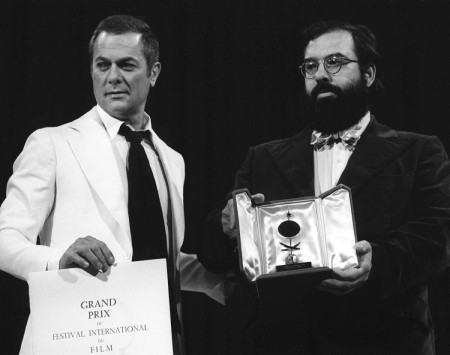
As the 2015 Cannes Film Festival makes headlines today, we flashback to the Festival of 1974 — and the winner of the esteemed Palme d’Or, Francis Ford Coppola’s The Conversation. The film was inducted into the National Film Registry in 1995.
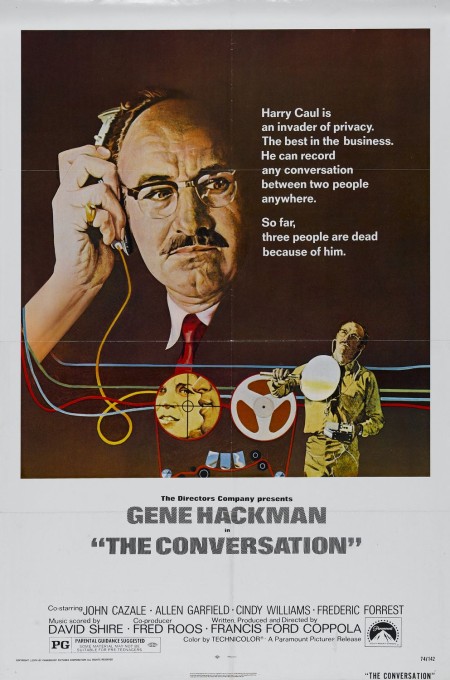
Produced, Written and Directed By: Francis Ford Coppola
Genre: Whydunit
Opening Image: San Francisco’s Union Square. From high above, we watch the midday crowd. Slowly the camera hones in on one man: Harry Caul (Gene Hackman). As this establishing scene will soon reveal, Harry is a surveillance expert and he is on the job, along with a small team, recording a conversation between a couple, Ann and Mark (Cindy Williams and Frederic Forrest).
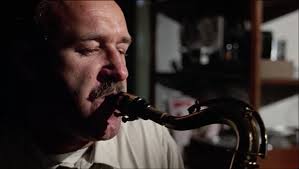
Set-Up: Harry is the best in the business and, perhaps because of this, guards his own privacy well. His apartment is triple-locked and protected by an alarm. He’s even on high alert when someone manages to learn it’s his birthday and delivers a gift to him, after which Harry spends the afternoon alone in his apartment practicing his saxophone.
Theme Stated: In the opening scene, and repeated throughout the movie, an exchange between the observed couple reveals the theme. Mark says, “He’s not hurting anyone,” and Ann replies, “Neither are we.” Just as Harry insists he’s not responsible for the content of his surveillance or for how it’s used by his clients, the question of participation will be examined.
Catalyst: Ann and Mark, at the end of their opening scene rendezvous, set a meeting at a hotel room to occur in a few days’ time. The words are clearly recorded but their meaning is ambiguous enough to spark Harry’s interpretation and his subsequent actions.
Debate: Harry works his magic on merging the surveillance tapes into one record of the conversation. He arranges for the handoff to the client and his payment, but something about it bothers him. What will happen when he hands over the tapes? And just what is his duty in this situation?
Break into Two/B Story: That night, Harry calls on Amy (Teri Garr), a girlfriend in as much as a man as private and guarded as Harry could have a romantic partner. When she learns it’s his birthday she asks him to tell her something personal, a secret. She reveals she knows how suspicious he is of her, as if he’s going to catch her up to something. It’s not an exaggeration; Harry seems very suspicious of everything Amy does, every word she says in the scene. She asks too many questions that he doesn’t want to answer, and when he walks out it’s clear to both of them that this is the end of their relationship. It would seem that Harry is incapable of having a truly open relationship.

Fun and Games: Harry meets with the client’s assistant, Martin Stett (Harrison Ford), to exchange the tapes for payment, but something doesn’t sit right with him and Harry walks out with the tapes. Waiting for the elevator, he sees Mark. Moments later, Ann steps onto the elevator with Harry. Neither seem aware of his presence or identity.
Back at his workspace, Harry continues to enhance the tapes. He concentrates on one key phrase hidden under the sound of a street musician, finally filtering it out clearly: “He’d kill us if he got the chance.” Harry is affected by these words and later when he goes to confession he reveals that in the past, people have been hurt as a result of his work.
At a surveillance trade show, Harry sees Martin Stett and believes the man is following him. But Martin tells Harry he was looking for him, not following him, and doing so to set up a meeting with The Director (Robert Duvall), the client who commissioned the surveillance of Mark and Ann.
Midpoint: Following the convention, Harry brings a group of colleagues back to his workspace. Though it’s a party, the “second best” in the business dogs him about trade secrets and partnering up. A trade show model flirts with Harry, and ends up staying the night. It’s an intertwining of his personal life with his professional life, the effects of which will play out throughout the rest of the second act.
Bad Guys Close In: At the tail end of the party, the story of Harry’s most famous job is explained and we learn that three people were murdered as a result of it. This is the ghost that’s been haunting Harry. And now, even with a woman seducing him, Harry can’t get his mind off of the conversation between Ann and Mark, and his fear that he could be responsible for another such tragedy. Harry dreams about it that night, telling Ann in his dream that he’s not afraid of death, but he is afraid of murder.
All Is Lost: When Harry wakes up, the model is gone—and so are his tapes of the conversation.
Dark Night of the Soul: Harry reaches Martin Stett, who confirms they have the tapes. Martin tells him the tapes have nothing to do with Harry, and they are ready to pay him in full for the work he’s done.
Break into Three: Harry goes to The Director’s office to complete their business transaction. He finds the Director listening to the tapes, and asks him what he will do to Ann.
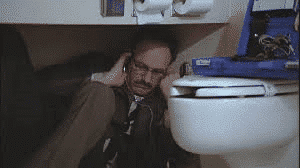
Finale: Fearing what will happen to the couple, and in a classic Dark Turn that breaks his own personal code of non-involvement, Harry rents the hotel room next door to the one where the couple planned to meet. Using his monitoring equipment, he overhears a heated argument between Ann and The Director, and to his horror, the tape being played back at a particularly incriminating moment. Harry runs to the balcony outside, hears screaming, and witnesses a bloody hand frantically slamming against the frosted glass partition.
Several hours later, Harry picks the lock into the room and initially sees nothing amiss. On closer investigation, he flushes the clogged toilet and torrents of blood come flowing out. Harry tries to confront The Director at his office, and is stunned to instead find Ann and Mark, unharmed. Their conversation didn’t mean what his guilt-wracked mind interpreted it to mean.
Harry sees a newspaper headline about The Director’s death in a “car accident,” and knows that the couple killed him in the hotel room. Harry now realizes that the statement “He’d kill us if he got the chance” was a rationalization of the couple’s decision to kill The Director.
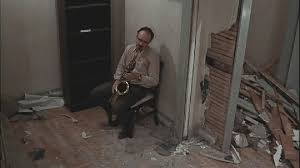
Final Image: Later, Martin Stett calls Harry on his unlisted number and warns: “We know that you know, Mr. Caul. For your own sake, don’t get involved any further. We’ll be listening to you.” Stett plays back a recording of Harry’s moments-earlier saxophone practice, which sets Harry off on a frantic search for a listening device. He tears up walls and floorboards, destroying his apartment in the process, but to no avail. In the final image, Harry sits amidst the wreckage, playing his saxophone.
Naomi Beaty
5 Comments
Leave a Reply Cancel reply
You must be logged in to post a comment.


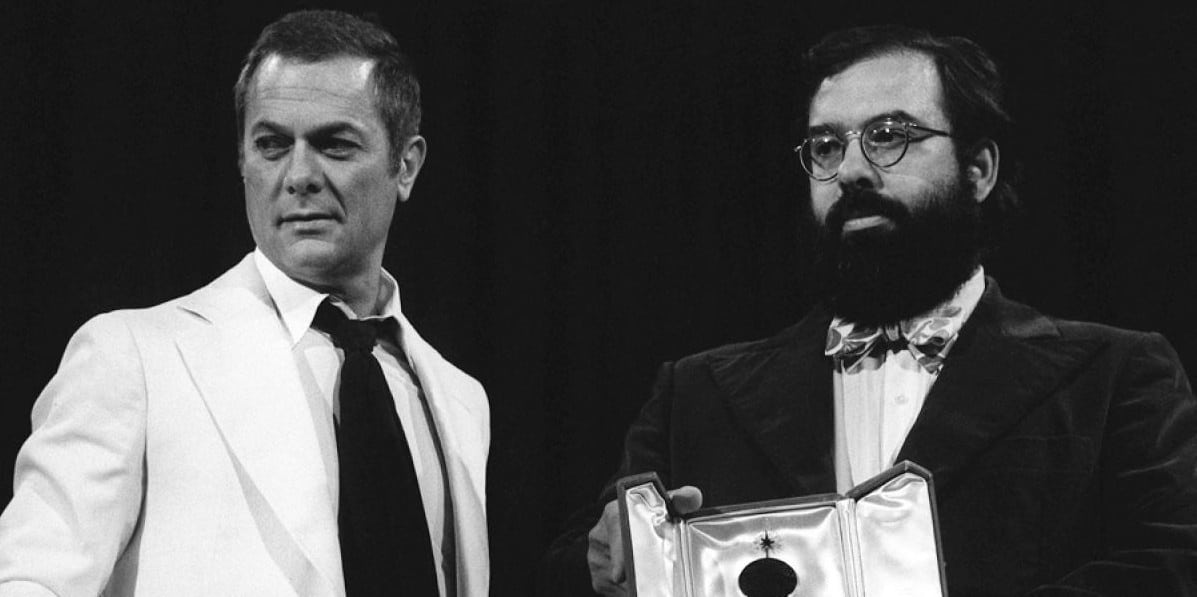







I saw “The Conversation” long ago and I loved the way you worked its beatsheet out. Thanks.
Thank you so much! It’s such an elegantly told story.
Naomi, Thank You!!!!!!! One of my favorite films!!!! And I have been trying to utilize my Save the Cat software more into my personal work, but I just realized I need some examples of the films that I like and am influenced by and you posted this classic films Beat Sheet!!!! Thank you!! thank you!!!! thank you!!!!!
Hugs from this side of Hollywood,
Fantastic! I hope it helps to spark some new ideas!
Great site and I love all the beat sheets! I do think that in The Conversation there is an internal and external inciting incident or catalyst. Internal as is mentioned in the beat sheet but external when he refuses to hand over the envelope because the director isn’t there.